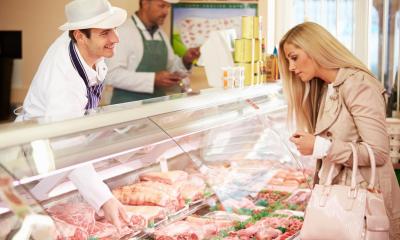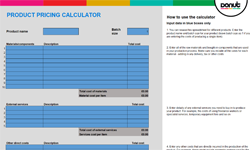
Craft butchers have excellent cutting skills and product knowledge and look to source the best quality meat to help build up a loyal customer base. Our practical guide will help you start up and run your own butchers business.
- Decide what you will sell in your butchers shop
- What competition will your butchers shop face?
- Who will shop in your butchers?
- Buy an existing butchers shop
Decide what to sell in your butchers shop
Most retail butchers sell a mix of some or all of the following:
- carcase meat, including beef, veal, lamb and pork
- poultry meat, including chicken, turkey and duck
- offal
- processed meat products such as bacon, ham, sausages, black pudding and haggis
- other products such as pies, quiches and pâté
- sandwiches
- other grocery and delicatessen items
Customers are increasingly on the look-out for convenience and quality-assured products. Research by IGD, the food and grocery research and training charity, found that more than six out of 10 British shoppers are willing to pay more for higher-quality fresh meat with assured provenance demonstrated by a quality assurance logo, like the Scotch Beef PGI.
Convenience has also become a very important factor. Customers want food that is easy to cook and does not require long preparation time. Most people say that an hour is too long to spend preparing a meal and many find even 40 minutes excessive.
You should consider the way you cut meat to give your customers what they want, for example using seam butchery, cutting more muscle into steaks to reflect the decline in the popularity of traditional roasting joints. Many butchers are selling mini joints which are performing well.
You could also think about cutting different steak ranges, like flat iron steak, tender top, ranch and bistro steak, which are all popular with customers. They generally now prefer thin-cut steaks, so instead of the average 250g, many customers would rather have more affordable 150g steaks. These are seen as healthier, more affordable and quick to cook. Other changes to make meat more affordable include new cuts such as flank steaks and different-size packs.
You may find that to attract a sufficient number of customers, you will need to offer products that are different in some way to those that your competitors sell. You could consider selling:
- meat smoked in a variety of different ways. You could also consider stocking, for example, a range of chutneys and pickles that would complement these meats
- meat sourced from rare breeds, such as Gloucestershire Old Spot pigs, Traditional Hereford cows and Llanwenog sheep
- meat sourced only from herds and flocks that comply with farm assurance schemes. The major supermarket chains source most or all of their fresh meat from producers who participate in farm assurance schemes (with the Red Tractor being the most prominent) and you may find that some of your own customers will be reluctant to buy meat that isn't raised to these standards
- meat sourced from local farms. You could feature different farms at different times and perhaps invite the farmer to a tasting event to talk about how the livestock is reared
- only organic meat, if you believe that there will be enough of a market in your local area
- more unusual meat such as venison, wild boar, wild rabbit or hare
- game birds, such as pheasant, grouse and partridge that may be difficult to obtain elsewhere
- 'flexitarian' products (products with less meat and around 35% fruit, vegetable or pulses) which are seen as a healthy option
Seasonality
There is increased demand for different types of meat at certain times of the year. There is always great demand for turkeys and chicken at Christmas, as well as other poultry such as goose, and for game. Chicken proved more popular than turkey for Christmas 2021 but there was a decline in sales of whole birds in favour of more convenient options. Multi-bird roasts have also gained in popularity in recent years. It is likely that you will also have increased sales of other joints and pies at this time of year. Sales of lamb generally increase around Easter time. You may see a rise in demand for barbecue food such as chops, sausages or burgers during the summer months if the weather is good.
What competition will your butchers shop face?
Estimating demand
It's very important to make an estimate of the number of people that will use your shop each day and the amount they will spend. You need to be aware that the retail meat sector is dominated by the large supermarkets and that the number of independent butchers - and the market share that they hold - has fallen significantly over the last 20 years as a result. Supermarkets and symbol shops have dominated the market between them, while independent butchers find their market share declining.
Meat and other items normally sold by butchers are available from many different outlets such as:
- supermarkets
- convenience stores, including those owned by the supermarket chains such as Tesco Express
- freezer centres
- farm shops, farmers markets and delicatessens
- online butchers
So it's a good idea to find out whether there is room in your area for your proposed butchers shop. First of all, check out the local competition. Count how many outlets there are already in your area which sell meat and meat products and identify the range of goods they sell. If some of these are specialist butchers, note down whether they are independents or part of a regional chain.
To get an idea of potential customer numbers you could stand outside an existing butcher in a nearby location and make a head count of the number and type of people who shop there. Make a note of any days that are busier than others.
Why will customers choose your butchers shop?
It's important to do all you can to make sure that enough people will choose your business rather than buying meat and meat products from your competitors, some of which will almost inevitably be supermarkets offering the products that you sell at prices you may find difficult to match.
Once you have completed your review of the range of products sold by your immediate competitors you'll have a better idea of what sells best in your local area. It should also give you some ideas for products and services that are not currently offered by existing businesses and which could help your shop stand out from your competitors.
Catchment area
If you plan to open as a premises-based retail butcher (rather than a catering butcher or online specialist), passing trade will be very important to you. Note down the different types of potential customer (for example young families, pensioners and so on) living and working in the area where your business will be. This will help you to decide on your product range. For example, if there are a lot of offices and other workplaces near to your shop, you may consider offering ready-to-eat lunchtime items like sandwiches and pies. Many butchers have diversified into bakery lines so that they can offer customers a selection of sandwiches made from baguettes, wraps, ciabatta and so on.
Increasingly, butchers are selling their products online which can enable them to significantly expand their potential customer base.
Find out what people want
It can be a good idea to get out and talk to people in your area about your plans for your business. Ask as many people as possible:
- what sort of products they would like you to offer
- what opening hours would suit them best
- if there would be a market for pre-prepared items like pies, sandwiches and so on. You could ask them to try some samples and give you some feedback
- whether trends have caught on in the area, for example pulled pork
Trade sales
You might be planning to sell meat and meat products to local shops such as small independent grocers or to businesses such as restaurants and cafés, sandwich bars, takeaways, hotels, local schools and so on.
If you plan to target trade customers it would be helpful to:
- count the number of potential trade customers in your area
- work out what product ranges you will offer them
- work out how much discount from your retail price you will offer them
- decide how frequently you will supply them. Most businesses will want a daily delivery service, so you will need someone to drive the delivery vehicle
- approach them to see if they would be interested - don't forget if they are already being supplied they'll need a good reason to change. This might be because you offer a wider product range, lower prices or a better service
Research current trends, plus legal and tax issues
Who will shop in your butchers?
Your market
You might have several different types of customer, depending on the nature of your business. For example:
- members of the public
- local businesses such as restaurants and hotels
- trade customers such as other retail outlets who sell on your meat and meat products
- local organisations like primary schools and day nurseries
- local farm shops for which you cut, and possibly package, meat ready for sale
Retail sales
The members of the public who you make retail sales to are likely to vary according to the location of your shop and the population that it serves. This may mean, for example, that it is worth offering a range of convenience items like pasties and sandwiches to serve to a lunchtime market or even hot bacon rolls to cater for commuters on their way to work in the mornings.
As well as supermarkets, the increasing number of butchers with an online presence is posing serious competition to local independents. You might want to consider selling your products online to be able to compete. This would open up your potential market to include customers from all over the UK.
It is worth remembering that about half of all households are single households with moderate incomes. These customers are looking for convenience and affordable products.
Trade sales
If you are planning to sell to trade customers it is a good idea to get in touch with some as part of your market research to try to establish:
- what items they would want, and how many of them
- how frequently they would want them
- whether they are happy with your proposed trade price list - it's normal to offer a discount from your retail prices to trade customers. This might vary between 5% and 20%, depending on how big the order is
The industry bodies AHDB Beef and Lamb and AHDB Pork provide a number of resources to help butchers start and grow their businesses. You can find out more on their 'Meat Trade' and 'Pork for butchers' websites.
 Free pricing calculator
Free pricing calculator
Setting the right price right is essential. Too high, and you'll struggle to make the sale. Too low and you're throwing away potential profit.
Make sure the price is right with our free product pricing calculator. Answer a few quick questions to work out what you should be charging.
Special offers and discounts
You may decide to offer discounts to certain groups of people, such as pensioners or students or on sales made during quieter periods of the week as a way of boosting sales. You may also decide to offer discounts on stock that is approaching its sell-by date so that you are not left with excessive amounts of wastage at the end of the day.
Don't forget to brief your staff on which, if any, customers are entitled to a discount and how much. Guard against staff offering unauthorised discounts to their friends and relatives. Work out how much discount you will allow to your staff and what, if anything, they can eat on the premises free of charge (if, for example, you are planning on selling pre-cooked items).
Advertising your butchers shop
Whoever your customers will be it is essential that they get to know about you.
There are a number of things you could do to promote your business:
- distribute a leaflet that tells people about your shop, including details of your product range and prices
- advertise in your local newspaper and any other local publications
- create a business profile on an online directory such as Google My Business and Yell.com
- set up your own website which includes pictures of your most tempting product ranges and details of any outstanding features of your range. You could even take orders online. It's a good idea to regularly email registered customers with details of seasonal special offers
- have tastings and promotions to make customers aware of your range
- make a feature of your window display to attract customers
Buy an existing butchers shop
You might decide to buy an existing butcher's shop rather than start your own venture from scratch. Buying a going concern can mean that:
- the premises, shop fittings and equipment are already in place
- refrigerated delivery vehicles have already been purchased
- there are established customers
- the business can generate income immediately
- suppliers have been identified and relationships established with them
- the business has a track record which can help if you are looking for finance
- staff are already in place
- a website to advertise the shop and possibly to make online sales has already been set up
However, look critically at any business that you are interested in to make sure that the price you negotiate with the seller is a fair one. Try to establish why the business is for sale - for example, is the owner keen to retire or is there another personal reason for selling up.
Your market research into the sector as a whole and the locality in particular will help you to establish whether or not the owner is selling because he or she can no longer generate enough income from the business. This may not necessarily deter you - many business people are confident that they can turn a failing business around. The important thing is to have established the current position so that the price you pay for the business is not too high.
Other matters to consider include:
- the state of the premises, equipment and so on. Will you have to spend money refurbishing or replacing assets
- the condition of any stock you are buying. Check this over carefully before agreeing a price
- existing staff rights
- how to retain key personnel once you've taken over
- does the business owe money that you will be responsible for
- if you are paying for goodwill, to what extent does this depend on the skills and personality of the seller
Ask your accountant to look critically at the business accounts for the past three years and discuss with him or her the selling price in the light of what the accounts reveal. Make sure that you budget for other professional fees such as legal fees and valuation and survey costs.



